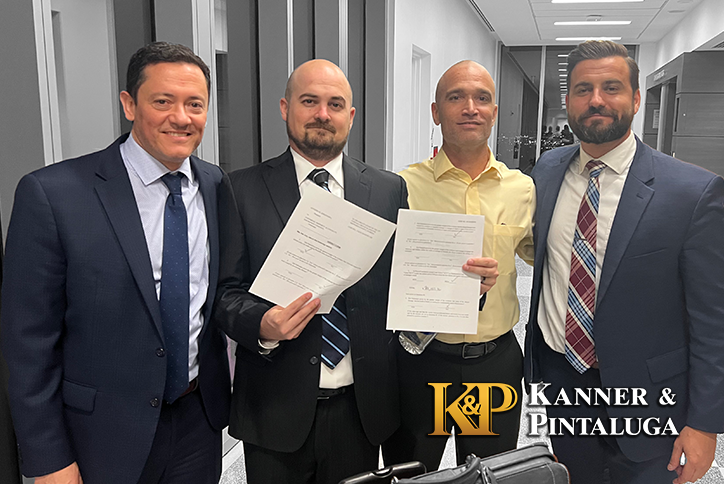
Veredictos y acuerdos: Se alcanzó un acuerdo por $400,000 en un accidente trasero que provocó una colisión entre varios vehículos
enero 3, 2023
Veredictos y acuerdos: El jurado otorga al propietario casi cuatro veces la cantidad pagada por el transportista por daños a tuberías rotas
enero 13, 2023
Autor: David Lipman, Esq., Director Jurídico | Consejero General, Kanner & Pintaluga
Como abogados, a menudo nos encontramos en posesión de fondos que no nos pertenecen ni a nosotros ni a nuestro bufete. En ocasiones, puede haber múltiples partes, incluido el propio abogado, que reclamen un interés en los fondos fiduciarios. En esos casos, los fondos deben ser tratados por el abogado como propiedad fiduciaria, con la advertencia de que la parte de los fondos que pertenezca al abogado o al bufete o cualquier otro fondo que no esté en litigio debe ser desembolsado en un plazo razonable. La Regla 5-1.1 de las Reglas Reguladoras del Colegio de Abogados de Florida exige que un abogado "(u)na vez que reciba fondos u otros bienes en los que un cliente o un tercero tenga un interés" notifique a dichas partes la recepción de los fondos.
¿Cuál es la responsabilidad ética de un abogado frente al acreedor judicial de un cliente?
Es una cuestión más matizada, pero según la Regla 5-1.1.(f) un abogado puede tener el deber de proteger al tercero contra la interferencia ilícita de su propio cliente. En aquellas situaciones en las que la reclamación del tercero sobre los fondos fiduciarios no sea frívola según la legislación aplicable, el abogado debe negarse a entregar los fondos al cliente hasta que se resuelvan las reclamaciones. Esta situación única crea la posibilidad de conflicto entre el abogado y su cliente, por lo que debe tenerse el debido cuidado para proteger la relación abogado-cliente. El abogado no debe determinar unilateralmente quién es el propietario legítimo de los fondos en litigio, sino que la mejor práctica dictaría que los fondos en litigio se depositaran en el registro del tribunal para que se pueda resolver la cuestión.
La situación más habitual en la que un tercero reclama fondos en fideicomiso es cuando un abogado deposita los fondos del acuerdo como resultado de una demanda por lesiones personales. En esos casos, los proveedores médicos del cliente reclamarán un interés en los fondos del acuerdo que ahora se mantienen en fideicomiso. Además, como se ha señalado anteriormente, en ocasiones el propio abogado puede tener un derecho sobre esos fondos y el cliente se lo disputa ahora. Las Reglas 5-1.1(e) y (f) proporcionan orientación y el abogado debe notificar inmediatamente al tercero que reclama un interés en los fondos advirtiéndole que los fondos han sido depositados en la cuenta fiduciaria del abogado. Si el tercero, ya sea un proveedor médico, el propio abogado o un acreedor judicial, tiene un derecho legal sobre los fondos depositados en la cuenta fiduciaria, el propio abogado tiene el deber legal de retener dichos fondos hasta que se resuelva el litigio. Sin embargo, si el abogado tiene o no ese deber legal con el tercero es una cuestión de derecho y no una cuestión ética regida por las Normas Reguladoras del Colegio de Abogados de Florida. Las Reglas sí advierten que un abogado puede actuar como negociador en nombre del cliente, pero no puede arbitrar unilateralmente la cuestión debido al deber del abogado para con su cliente y a la presunción de que un abogado no puede ser adverso a su propio cliente.
Como abogados, sabemos que nunca podemos actuar en contra de los intereses de nuestro cliente. Este es un principio ético axiomático del ejercicio de la abogacía y una de las normas éticas fundamentales que rigen a los abogados. Si un abogado se ve obligado a actuar en contra de los intereses de su cliente, debe tener en cuenta las obligaciones que le impone la Regla 4-1.7 sobre conflictos de intereses. En algunos casos, el abogado puede verse obligado a retirarse del caso como consecuencia del conflicto, salvo acuerdo de las partes implicadas en el litigio o resolución de un tribunal competente.
Sin embargo, si un abogado está seguro de que, en virtud de la ley, deben tomarse ciertas medidas, entonces, en esas raras situaciones, el abogado debe tomar medidas adversas a su cliente, pero sólo después de asesorar plenamente al cliente sobre la medida prevista y la base razonable para tomar la medida adversa. Además, el abogado siempre debe advertir al cliente de que tiene derecho, y de hecho debe recomendarle, que busque asesoramiento jurídico independiente antes de emprender cualquier acción en contra de sus intereses. Esto incluiría el depósito de los fondos fiduciarios en disputa en el registro judicial para permitir que el tribunal resuelva la disputa entre el cliente y el tercero. Siempre que sea posible, el abogado debe actuar como defensor del cliente en la resolución del litigio.
El Reglamento del Colegio de Abogados de Florida y la jurisprudencia sobre el deber fiduciario establecen que, en general, los abogados deben proteger los fondos fiduciarios que son legítimamente en litigio y cuando el abogado tiene una obligación legal con el tercero que reclama un interés. Si el abogado determina que el tercero no tiene una reclamación legal válida, entonces, en última instancia, el abogado no tiene el deber de proteger los fondos fideicomitidos. Sin embargo, si el tercero tiene una reclamación legal válida, entonces el abogado debe caminar por la cuerda floja ética entre las normas de conflicto de intereses, su deber fiduciario y su deber legal con los terceros en cuanto a la cantidad en disputa de los fondos fideicomitidos, mientras trabaja simultáneamente para arbitrar, mediar o resolver la disputa por la vía judicial.
Consigue lo que mereces
Kanner & Pintaluga es una firma demandante nacional agresiva, ética y orientada a resultados comprometida a representar a víctimas de accidentes, lesiones graves y daños a la propiedad. Con un equipo de casi 100 abogados, tenemos la experiencia y los conocimientos para lograr el resultado más favorable para nuestros clientes. Si podemos ayudarlo o si simplemente desea hablar con un abogado para obtener la ayuda que necesita, no dude en contactarnos. Nuestro equipo siempre está disponible para discutir sus derechos y asegurarse de que usted y su familia estén protegidos.

